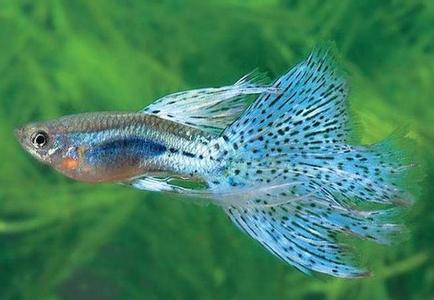(单词翻译:单击)
听力文本
This is Scientific American's 60-second Science, I'm Jason Goldman.
Got a minute?
Humans aren't the only species that forms friendships. Lots of animals prefer to spend their time only with certain individuals.
"It's all very well showing that you do get social relationships and social bonds forming, but why on earth would you form them in the first place?"
University of Exeter animal behavior researcher Rob Heathcote. He and his team wanted to find out what benefit animals derive from close social relationships. To do it, they set out for the Caribbean island of Trinidad, home of a small freshwater fish called the Trinidadian guppy.
"These guppies live in environments that have tons of predators around, so basically it really sucks to be a guppy. In some places they live, you'll be watching these shoals of guppies and a predator is attacking them every twenty or thirty seconds or so."
One common idea is that such animals form social groups to reduce the risk of being gobbled up. But Heathcote wanted to see whether the benefits of social living might come from the strength of individual social relationships rather than simple safety in numbers.

The researchers caught 240 female Trinidadian guppies and divided them into groups of fifteen, each group in its own small pool. While some of the fish were left alone, others were exposed to what looked like a predator—a doll version of a guppy-eating fish called a pike cichlid.
Those guppies exposed to the ersatz predator were more likely to establish stronger social bonds. But the groups formed by those guppies were on average smaller than the groups formed by the fish that were not exposed to predators.
Heathcote thinks that the tighter-knit friendships that come from small groups allow guppies to more effectively cooperate in their predator avoidance activities.
"You can either hang out with a load of guppies, and every time these predators attack, you're unlikely to be the one that gets eaten. But obviously the first thing that happens when you form a big shoal is that this attracts every single predator in the vicinity... The alternative is you can be inconspicuous in a small social groups of three (or) four individuals. Everyone's kind of looking out for each other, they've got each other's back."
So spending time with a few close friends could outweigh the benefits of blending in with the crowd, particularly in dangerous situations.
"Friendship," said Winnie the Pooh writer A. A. Milne through his character Christopher Robin, "is a very comforting thing to have." Especially when there's a big scary fish trying to eat you.
Thanks for listening for Scientific American — 60-Second Science Science. I'm Jason Goldman.
参考译文
这里是科学美国人——60秒科学,我是杰森·古德曼。
有一分钟时间吗?
人类不是唯一产生友谊的物种。许多动物喜欢与特定的个体共度时光。
“这一切都明显表明,你确实形成了社会关系和社会纽带,但是这种关系一开始到底是怎么形成的?”
罗布·希思科特是埃克塞特大学的动物行为研究员。他和他的团队想了解动物从亲密社会关系中获得的好处。为了研究,他们出发去加勒比海的特立尼达岛,那里是一种名为特立尼达孔雀鱼的小型淡水鱼的家。
“这些孔雀鱼生活在有很多掠食者环绕的环境中,所以身为孔雀鱼真的很可悲。在它们生活的地方,你会看到一大群孔雀鱼每20秒或30秒就会遭遇掠食者的攻击。”
普遍的观点是,这类动物结成社会群体以降低被吞食的风险。但希思科特想知道社会生活的益处是否来自于个体社交关系的强度,而不是来自群体带来的简单安全。
研究人员捕捉了240只雌性特立尼达孔雀鱼,并将它们分为15组,每组鱼都有单独的水池。其中一些鱼被单独分开,其它鱼被暴露在一个看起来像捕食者的“鱼”面前——这是一个以孔雀鱼为食的棘鲷的模型。
那些接触捕食者模型的鱼更容易建立起更强的社会联系。与没有暴露在掠食者模型面前的鱼所形成的群体相比,这些孔雀鱼形成的群体平均规模要小一些。
希思科特认为,小群体会形成更紧密的友谊,这使孔雀鱼在躲避捕食者时能更有效地进行合作。
“你可以和一堆孔雀鱼呆在一起,每次捕食者发起攻击时,你就不太可能成为被吃掉的那一个。但是很明显,一个大型鱼群形成时,会吸引来附近的所有捕食者……另一个选择是,三四个个体组成一个不起眼的小型社会群体。这样每个成员都可以互相照顾,互相依靠。”
因此,与几个亲密朋友共度时光的好处可能多于融入人群,尤其是在危险的情况下。
《小熊维尼》的作者A.A.米尔恩通过他创造的角色克里斯托弗·罗宾说,“友谊是我们拥有的令人感到十分欣慰的东西。”尤其是一只可怕的大鱼要吃掉你的时候。
谢谢大家收听科学美国人——60秒科学。我是杰森·古德曼。
译文为可可英语翻译,未经授权请勿转载!
重点讲解
重点讲解:
1. set out 动身;出发;启程;
例句:We set out with enough provisions.
我们带上足够的食品出发了。
2. or so …左右;…上下;
例句:It'll only cost 15 dollars or so.
只要十五美元左右。
3. gobble up 吞并;击垮;
例句:The white cells gobble up the invaders, and the antibodies knock them out.
白血球吞噬掉这些异物,抗体则将其杀死。
4. look out for 考虑…的利益;关照;
例句:I'm just trying to look out for you.
我只是想要为你着想。


